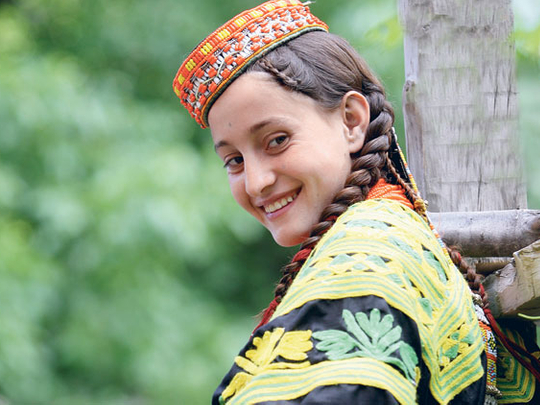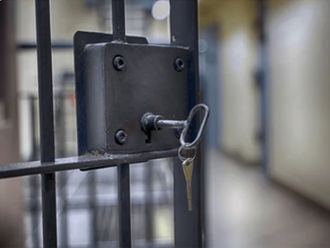
Where is Chitral? How can I go to Kalash valley? Is it a tourist-friendly place?
The Chitral district is situated on the western bank of the Kunar river near the Hindu Kush mountains in Pakistan. The Kalash live in Chitral valley in the northern district of the Pakistan’s Khyber Pakhtoonkhwa province. The three Kalash valleys – Bumburet, Rumber and Birir – are situated south west of Chitral town at a distance of nearly 40km. The biggest valley is Bumburet while the smallest is Birir. Visitors can go to Kalash by air as well as by road. Pakistan International Airlines flies from Dubai to Islamabd and Peshawar and you can get connecting flights to Chitral (subject to weather conditions). Also, you can go by road from Isalamabad and it takes about 10 hours. It takes about seven hours of road trip from Peshawar. The best deal is to book your trip through Hindukush Trails (www.hindukushtrails.com). Foreigners will require a special government permission apart from a tourist visa to visit the Kalash people.
Who are the people of Kalash? What’s so unique about them?
The Kalash, with unique culture, traditions, rituals, values, festivals and dress, are a tribe from Chitral – the northern district of the Pakistan’s Khyber Pakhtoonkhwa province. They are non-Mulsims who follow their own religion, language and customs, and are believed to be the descendants of legendary Greek emperor Alexander. They lead a centuries-old primitive way of life and practice a religion which has no name, no written book or prophets. They live in three valleys which are called Kalash Gooni among the Kalash and the ‘Kafir Kalash’ (Land of Infidels) among others. Apart from the unique ethnicity of the people, Kalash valley is believed to be a paradise on earth replete with fresh water streams, lakes, waterfalls, forests and orchards. It swarms with wildlife, goats and cows, and is cut off from the rest of Pakistan for nearly half of the year due to heavy snow.
Are they really descendants of Alexander the Great?
Opinion is divided regarding the real ancestry of the Kalash. Some of the tribe members say that a few soldiers of Alexander’s army came to Chitral and ruled the area for a couple of centuries before being pushed to these valleys. Others believe that their forefathers were Aryans. Yet others say that a certain General Shalek Shah deserted Alexander’s army and came to Chitral; eventually their descendents settled down in Kalash valleys. Today, the Kalash are a minority even in the Kalash valleys. There are less then 4000 ethnic Kalash people left in a population of about 17,000. The rest of them are Muslims, including a large number of converts from Kalash.
What language do the Kalash people speak?
The Kalash people speak their independent language, also known as Kalash. Their language alphabets were developed about 30 years back: they use Roman alphabets but pronounce them with a different sound. Some Kalash elders have recently urged local schools to include Kalasha language as part of the curriculum, because the medium of education is only Urdu, except for a couple of dedicated primary Kalash schools built by NGOs. The language, which belongs to the Dardic school of Indo-Aryan languages, is considered endangered by Unesco.
Is there any recorded history of the people of Kalash?
Yes, there’s plenty of historic material on them. The Kalash were historically the predominant people of Chitral. They ruled Chitral for three centuries (1200-1400AD). They ruled Southern Chitral up till the middle of the 14th century. Remnants and ruins of Kalash forts are still visible in Uchusht, and Asheret . The famous bridge over Chitral River known as Chee Bridge was also built by a Kalash ruler. The names of Bala Sing, Razhawai and Nagar Shao are still alive in the folklore of Chitral. They were the most prominent among the eight Kalash Kings.
Profile: Who was Alexander?
Alexander the Great (356-323 BC), the Greek King who conquered the Persian empire and annexed it to Macedonia, is considered one of the greatest military geniuses of all times.
He created one of the largest empires in ancient history. Born in Pella in 356 BC, Alexander was tutored by the famed philosopher Aristotle, succeeded his father Philip II of Macedon to the throne in 336 BC after the King was assassinated and died 13 years later at the age of 33.
Although both Alexander's reign and empire were short-lived, the cultural impact of his conquests lasted for centuries. He is the first king to be called "the Great."
In the winter of 327 BC, Alexander passed through what is now Pakistan during his campaign to invade the Indian subcontinent. It is not known exactly where he crossed, but it’s believe that he went up the Kunar River in Pakistan, close to where the Kalash live now, and crossed a mountain pass into what is now Bajaur Valley.












